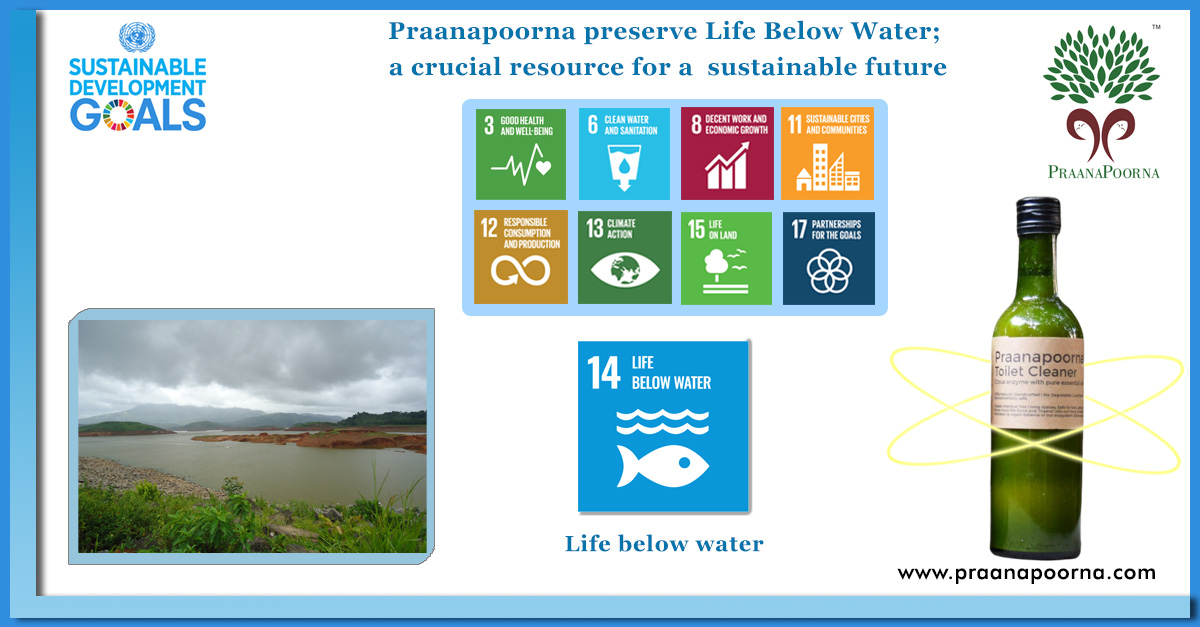No products added!
Healthy oceans and seas are a vital part of our lives. Our rainwater, drinking water, weather, climate, coastlines, much of our food, and even the oxygen in the air we breathe, are all ultimately provided and regulated by the sea. Meticulous management of this crucial global resource is a key element of a sustainable future. There is an ongoing deterioration in coastal waters caused by pollution and acidification, due to very high GHG emissions owing to anthropogenic activities and has an adverse effect on the functioning of ecosystems and biodiversity.
‘Life below water’ SDG 14 is gaining a lot of ground with considerable consciousness on the topic coming through reclaimed ocean plastics.Also this goal has a role to play in fisheries and food security. Research says that there are more plastics and micro plastics in oceans than fishes. It is a big issue for the ecosystem damage which is extremely important for our marine life.
Main targets of this goal include , prevention and reduction of marine pollution of all kinds by land based activities, including marine debris and nutrient pollution. Strengthening resilience and taking measures to restore them ensure healthy and productive oceans.
What are the challenges for this SDG
Approximately 80% of the marine and coastal pollution originates from land, including agricultural runoffs with pesticides, plastics and untreated wastewater when it flows into the ocean. Our oceans are swamped by two types of pollutants.; chemicals and trash.
Chemical pollution affects human health, environment and economy. Human activities such as use of fertilizers in farms, runoff of chemicals from households to streams that end up in the ocean make the scenario worse. Increased level of nitrogen and phosphorus favours algal blooms which can be toxic to wildlife and humans. This also negatively affects fishing and tourism industries.
The main marine trash is plastic, like fishing nets, shopping bags, beverage bottles along with bottle caps, food wrappers. Plastic is problematic because it is very durable and can take hundreds of years to decompose. It is dangerous for humans and animals. Fish get entangled and hurt in debris, and some animals confuse plastic bags with food and eat them. Small organisms feed on microplastics and absorb the plastic chemicals into their tissues. When humans get exposed to such chemicals through food, it could lead to various health problems including reproductive harm and obesity.
How Pranapoorna Products help
To address the aforementioned challenges and promote ocean sustainability, innovative solutions that prevent and mitigate impacts on marine environment are essential.
All Praanapoorna products are natural and handmade. The raw materials are locally sourced. Praanapoorna improved the resource efficiency by altering design, manufacture and use of products and packaging to reduce the amount of waste that could potentially enter the environment. They improved the resource efficiency by generating value from waste. Praanapoorna promotes adoption of a chemical free lifestyle as well as a zero waste to landfill lifestyle. Replacing chemical products from living spaces ensures safe living spaces and helps reduce chemical runoff to streams. They are limiting the use of hazardous chemicals, additives or any materials that could prevent closing the loop or lead to nutrient pollution if they happen to reach the marine ecosystem. The natural products of Praanapoorna help with the earth’s regeneration process by increasing the good microbes and enzymes. As part of their ‘towards landfill’ project they reuse the containers for packaging. Praanapoorna has already saved more than 1500 bottles reaching the landfill by reusing them and contributing to development of waste management technologies that minimizes the use of clean water. They aspire to revolutionize the way to prevent waste mismanagement that could pollute the ocean. Through regular workshops and awareness drives, Praanapoorna Collective raises consumer awareness on effective ways to properly dispose of waste to discourage littering and promote responsible behaviour.
993


